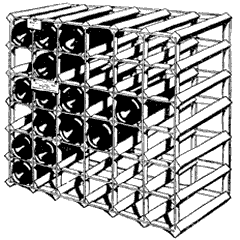 Wine information
Wine informationWine making process
The differences between red and white wines
French wine history
Wines from Spain
Port wines from Portugal
Italian wine history
German wine history
Hungarian tokay wine
Wines from Algeria
Brandy wine
How to buy wine
Wine storage tips<
Wine serving basics
History of wine
Types of wine glasses
Selecting wine for meals
Wine region map
Wine dictionary
Wine storage tips
As mentioned in the buying wine section, all purchases should be made in the cellar book, of which the pages should be ruled so as to allow of entries of all purchases (merchant's name, price, quantities, year of vintage, number of bin) ; and of consumption (with notes of character and condition of wine).
The wine cellar
There is little to say about the wine-cellar save that it should be of equable temperature, 53° to 58° Fahrenheit. Depth underground will preserve it from climatic changes of temperature and from undue vibration. It is necessary to see that no heating apparatus is in any way affecting it.Wine contains living organisms, and substantial changes of temperature can easily change their condition materially. The cellar must be dry.
It is important that every bottle or group of bottles should be readily accessible without moving other bottles. The wine, once binned, should be left undisturbed so far as is possible till it is
drunk. The image below shows a convenient form of storing bottles, called a winerack.

The bottle should always be on its side. In the case of Port-bottles the splash-mark should be uppermost, and always kept uppermost when
being moved. Sparkling wines soon become flat if stood on end. The most convenient, cheapest, and most compact bins are those of strip-iron and wood made up in two-dozen units.
If no cellar is available, as in many modern houses and, of course, flats, care should be taken to keep one's immediate supplies (it is
assumed that the wine merchant will hold the bulk of his customer's stocks in his cellars), in a place that is dry, not likely to be subject to excessive vibrations (as a cupboard under a much-used light staircase might be), not near any heating apparatus, and not with outside walls. This is to say that we must try, as far as possible, to approximate to the qualities of a good, dry cellar.Wine should not be kept in strong light.
The 'bottle' of wine contains two 'reputed pints.' The reputed pint is somewhat less than the imperial pint (British standard measure). It is natural that France, predominant in the wine trade, should have dictated the universal measure. A few years ago Claret was specially bottled in imperial pints, but this caused great complications and extra expense, and the practice has been discontinued.

